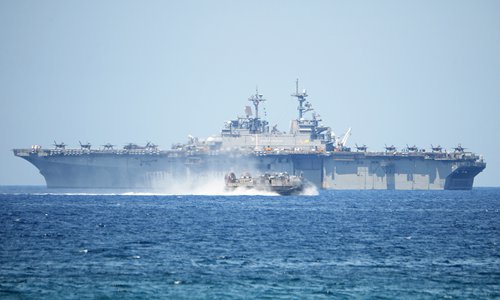HOME >> OPINION
Manila’s termination of military pact will upset US meddling in South China Sea
By Li Kaisheng Source:Global Times Published: 2020/2/13 16:00:15

A US Navy hovercraft speeds past the USS Wasp, a US Navy multipurpose amphibious assault ship, during amphibious landing exercises as part of the annual joint US-Philippines military exercise on the shores of San Antonio town, Zambales Province in April 2019. Photo: AFP
Philippine President Rodrigo Duterte on Tuesday announced the termination of the 1998 Visiting Forces Agreement (VFA), a bilateral security pact between the Philippines and the US, which allows US forces, including military ships and aircraft, to rotate through military bases of the Philippines and conduct some 300 war games annually with Philippine troops.
After the Cold War, the US pulled its forces out of the Philippines. The signing of the VFA in 1998 saw US troops return to the Philippines. The accord is a vital part of the US-Philippine alliance. Its termination will affect the substantial military cooperation and joint military drills between the two sides.
Duterte has repeatedly criticized US security policy and has not been entirely supportive of the military and political cooperation between the two countries. His administration has been pursuing greater balance in ties with the great powers. Deviating from previous governments, which attached great importance to the alliance with the US, the Duterte administration has been weakening Manila's longstanding alliance with Washington and has sought to improve its ties with China, Russia and Japan.
Never paying an official visit to the US, Duterte has long been critical of the US-Philippine alliance. Philippines Senator Ronald Dela Rosa, who served as chief of police when Duterte administration launched harsh anti-drug crackdown, confirmed in late January that his visa to the US was revoked by the US administration, which accused Dela Rosa of leading so-called illegal killings in the anti-drug war.
Duterte used this as a pretext to end the security deal but its termination is in line with his often-expressed critical view on relations with the US.
The termination of the pact will to some extent influence the political mutual trust between the two countries. The US-Philippine alliance has been maintained since the signing of the Mutual Defense Treaty in 1951. Although the US hasn't made a high-profile response to the Duterte administration's rhetoric and moves, the termination of the VFA will surely undermine bilateral ties.
The termination of the agreement will also have a substantial impact on US-Philippine military cooperation. Without the accord, it remains unclear how the US will engage in conventional military cooperation with the Philippines, and whether and how the US will send troops to this Southeast Asian country.
The impact on US-Philippine military cooperation will affect the situation in the South China Sea. Washington has repeatedly meddled in regional affairs through various means, such as sending its warships to conduct so-called freedom of navigation operation, and joint military exercises with other claimants, including Vietnam. Without the VFA, US interference with the South China Sea will be constrained.
The scraping of the deal will also impair the US' Indo-Pacific Strategy. The key countries involved are Japan, India, and Australia, and the nixing of the agreement in the Philippines will not fundamentally strike a blow to the strategy, yet, the end of the VFA will impact US strategy in the South China Sea, and thus complicate its Indo-Pacific Strategy.
Some foreign media outlets expressed concern that Manila will now gravitate toward Beijing, which I do not agree. The origin of the end of the VFA lies in moves made by the US and has nothing to do with China. The Duterte administration may be pursuing a more balanced strategy among great powers, but China is only one of them.
It remains to be seen how Manila implements the annulment of the VFA. Philippine Defense Minister Delfin Lorezana refused to comment when asked whether he approved of Duterte's plan to end the pact. This might signal a spat between the Office of the President and the Department of National Defense, reflecting their divergence on policy toward the US. Due to the presence of pro-US forces in the Philippine military, it remains to be seen whether bilateral military cooperation will continue in other ways.
The author is deputy director at the Institute of International Relations, the Shanghai Academy of Social Sciences. opinion@globaltimes.com.cn
Posted in: VIEWPOINT